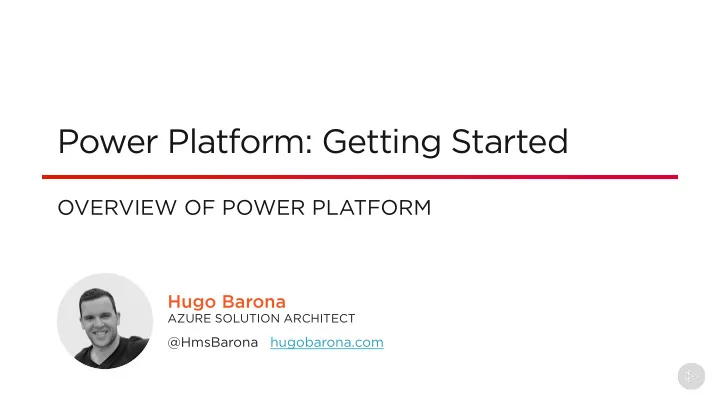

Power Platform: Getting Started OVERVIEW OF POWER PLATFORM Hugo Barona AZURE SOLUTION ARCHITECT @HmsBarona hugobarona.com
t h s Power Platform as a service - What is Power Platform - Power Platform benefits Overview - Value of connecting: Microsoft and third-party services and apps Administration and Security on Power Platform Compliance and Data Privacy on Power Platform Demo: Using Admin Centers in Power Platform
Power Platform as a Service
What Is Power Platform? Power Apps Power Power BI Power Virtual Automate Agents
Power Platform Features Artificial Common Data Data Intelligence Service (CDS) Connectors Builder
s h s Built AI capabilities with no code Leverage prebuilt AI models Create Custom AI models Available as part of Power Apps and Power Automate Artificial Intelligence Builder
Common Data Model Simplifies integration between systems and applications Shared data language Standardized and extensible data schemas and entities Easily share and understand the same data
s h s Central data repository Leverages Common Data Model Built-in connectors and APIs Standard and Complex entities and multiple field types Secure data using role-based security, business rules and environments Common Available on Power Apps and Power Automate Data Service
s h s Built-in Data Sources - Tabular data - Function-based data Multiple available operations - Triggers - Actions Supports Custom Connectors - Third-party API - Custom API Data Create from scratch, OpenAPI definition or Connectors Postman collection (and Azure services – preview)
Power Platform Data Types Internal Data External Data (Common Data Service) (Connectors)
Power Platform Benefits Analyze Act Automate Engage
Administration and Security on Power Platform
Power Platform Admin Centers Power Platform Power Apps Power Power BI Admin Admin center Automate center Admin center Admin center Dynamics 365 Administration center
Power Platform Admin Centers Capabilities Manage Environments and Analyze Key Metrics Resources Technical Help and Manage Data Policies Support Manage Data Integration Manage Data Gateways
Maintaining Data Integrity in Power Platform Security Privacy Compliance
s h s Authentication and Licenses - docs.microsoft.com/en-us/power- platform/admin/pricing-billing-skus Environments - Single geographic location - Default environment per tenant Role-based security model Common Data Service - Business Units and Teams - Entity/Record Access Security Data Loss Prevention Policies - Connector Classification (Business, Non- Business, Blocked) - Tenant and Environment-level scope
s h s Power Automate Governance Templates - preview.flow.microsoft.com/en- us/templates/ Powershell Cmdlets and Management Connectors Power Platform Center of Excellence Starter Kit Governance https://bit.ly/3bzRuRN
s h s Trust Center microsoft.com/en-us/trust-center - Data Location Data Protection - Transparent Data Encryption (TDE) TLS - - Data Gateway - GDPR Compliance Manager - Assessments Compliance Templates - Action Items - and Data - Controls Info Privacy aka.ms/compliancemanager - Service Trust
s h s Secure data transfer between on-premises and Power Platform Managed via Power Platform Admin Center Two types available - On-premises data gateway - On-premises data gateway (personal mode) Data Gateway
Best Practices to Secure and Govern Your Power Platform Tenants Perform risk assessments and define mitigation plans Create communication plans Plan and design environments Define and implement Data Loss Prevention policies
t h s Demo Steps - Access Power Platform Admin center - Create an environment - Create a data policy
t h s Explore Power Platform as a Service Understand the features and benefits of using Power Platform Summary Understand Power Platform Core components Understand administration and security on Power Platform How to use compliance resources, systems and tools available to comply with legal and regulatory standards
Recommend
More recommend